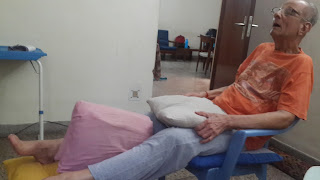 |
| My father, Anna, can speak English, Kannada, Tamil, Malayalam, & Hindi with varying degrees of proficiency Photo Courtesy: theodysseyonline.com |
My father was born and brought up in
Tamil Nadu and hence reads, writes, and speaks Tamil fluently. He learned
English in school, Malayalam when he was posted in Kerala, and Hindi, when he was required to pass a mandatory Hindi
test to get a Central Government job in the '50s / '60s.
My mother was born and brought up in Delhi and hence was fluent in Hindi.
As we are Kannadiga Madhwas, we all speak Kannada (me haltingly, often searching for words in desperation!) Most of the time, I speak with Anna in English, our primary language of communication.
As we are Kannadiga Madhwas, we all speak Kannada (me haltingly, often searching for words in desperation!) Most of the time, I speak with Anna in English, our primary language of communication.
 |
| My parents, sometime in the early 70s |
I learned Hindi only when I was 9 or 10
years old. Till then, Hindi was limited to the Bollywood songs my mother
listened to on the radio. At that time, we thought our father spoke great Hindi
(it sounded so much like the songs we heard!) We still laugh when we think of
how impressed we were when Anna said, "कलम में स्याही है"
("There is ink in the pen") - his earliest recollection of learning
Hindi was not the alphabet but this sentence. It was only much, much later that
we realized that Anna's Hindi was South-Indian accented with a very limited
vocabulary.
Anna has a great sense of humor, and is
a master of the art of quick repartee. This is not just the pride of a
daughter, you are reading, but something you will hear from almost anyone who
meets him. Before Parkinson's Disease and Dementia stole his ability to be
quick and nimble with his words, Anna was the center of attraction wherever
he went. Whether the gathering spoke English, or Kannada, or Tamil, if you
heard laughter, you were sure to find my father holding court!
Parkinson's Disease and Dementia, now
lets us experience only a small percentage of his wit and repartee (as you may
have gathered from my blog-stories at Parables of a Parkinson's Patient). But it is still there, and it is still communication, whether in
English or Kannada or Tamil.
 |
| 10 July 2017: One of Anna's "not all there" days |
Where once our language of communication was words strung together in any which way we pleased, we now often speak gestures and facial expressions. A language that involves more than a soupçon of detective work based on a long relationship of shared experiences and oft-repeated stories.
I now hear Anna tell me of his pain in
a frown, or his confusion in the wrinkled lines of his forehead. I see his
happiness in his toothless smile and his childlike excited chatter in the
twinkling of his eyes. I hear him struggling to find the right words in his tired frown and the slight upward movement of his pupils.
 |
We don't know them all
but We owe them all
22 July 2017 at Saket Select Citywalk
|
A lot of our language of communication
are these long-duration macro / micro-expressions. A language I have learned
without any formal training, and one that I am teaching his attendants.
This new language is not my mother
tongue but is starting to feel just as familiar.
There is no appropriate name for
this language - perhaps we can create one!